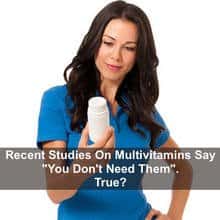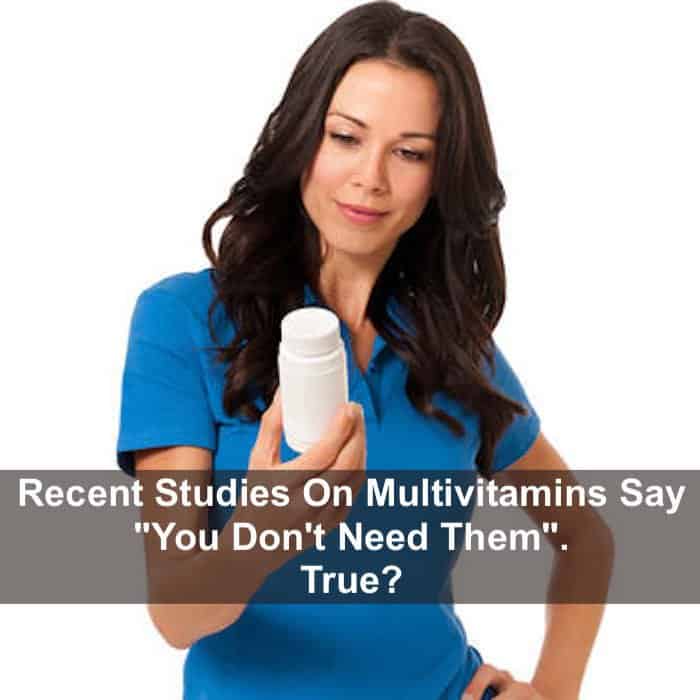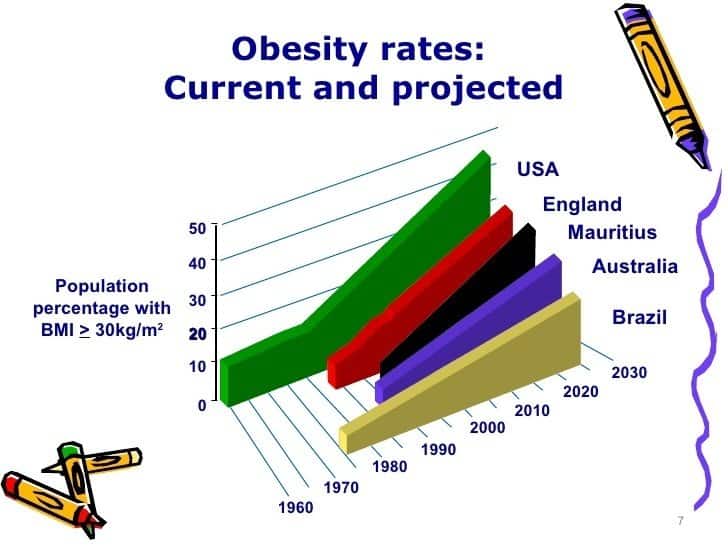Recent Studies On Multivitamins Say “You Don’t Need Them”. True?

If the recent studies on multivitamins are accurate, you don’t need them. Whether you do or not is based on your diet and any special needs you may have. Don’t toss your vitamins till you read this.
Recent studies on multivitamins show that there’s no advantage to consuming them.
Ouch, if that’s true, it suggests that half of all American adults, including 70% of those age 65 and older who take a multivitamin or another vitamin or mineral supplement regularly might be better off saving the $12 billion per year they spend on them. Johns Hopkins nutrition experts say you might be better spent on nutrient-packed foods like fruit, vegetables, whole grains and low-fat dairy products.
Yeah, that makes sense, but who does that?
The global fast food industry did not rake in over $570 billion by serving highly nutritious meals. In the United States, revenue was a whopping $200 billion in 2015 – quite a lot of growth since the 1970 revenue of $6 billion.
The Contradiction: Poor Dietary Nutrition, But No Vitamins Needed?
In the Introduction of his book, How Not To Die, Dr. Michael Greger points out that a dietary quality index was developed that simply reflects the percentage of calories people derive from nutrient-rich, unprocessed plant foods, called the “phytochemical index.”
The index is a scale of zero to one hundred. The higher people score, the more body fat they may lose and the lower their risk of abdominal obesity, high blood pressure, high cholesterol, and high triglycerides.
Comparing the diets of 100 women with breast cancer to 175 healthy women, researchers concluded that scoring higher on the whole plant food diet index (greater than about thirty compared to less than about eighteen) may cut the odds of breast cancer more than 90%. Sadly, most Americans hardly make it past a score of ten.
The standard American diet rates eleven out of one hundred. According to estimates from the U.S. Department of Agriculture:
- 32% of our calories comes from animal foods,
- 57% comes from processed plant foods, and
- only 11% comes from whole grains, beans, fruits, vegetables, and nuts.
That means on a scale of one to ten, the American diet would rate about a one.
And yet, researchers from Johns Hopkin’s study concluded:
- An analysis of research involving 450,000 people, which found that multivitamins did not reduce risk for heart disease or cancer.
- A study that tracked the mental functioning and multivitamin use of 5,947 men for 12 years found that multivitamins did not reduce risk for mental declines such as memory loss or slowed-down thinking.
- A study of 1,708 heart attack survivors who took a high-dose multivitamin or placebo for up to 55 months. Rates of later heart attacks, heart surgeries and deaths were similar in the two groups.
Among the recent studies on multivitamins is one done by researchers at St. Michael’s Hospital and the University of Toronto. They came to the same conclusions as did John Hopkins:
“We were surprised to find so few positive effects of the most common supplements that people consume,” said Dr. David Jenkins, the study’s lead author. “Our review found that if you want to use multivitamins, vitamin D, calcium or vitamin C, it does no harm — but there is no apparent advantage either.”
So, surprisingly, despite the fact that most Americans have nutritionally poor diets, recent studies on multivitamins conclude the are not needed. Hard to square that one.
Toss Your Vitamins and Save Billions?
Is it time to save yourself some dough and dispense with the vitamins?
Right now I’m typing away in a small seaside farming community in Sweden, where I’m care taking a small Alpaca farm. I came here for a change of pace and to focus on making some headway on my book, The Ageproof Method. (Go see some pics.)
The chapter of the book I’ve wrestled with is about supplements. On the topic of multi-vitamin/minerals, I’m taking the approach of “make the decision based on your diet, health issues and health goals”.
Assess yourself honestly
You could skip taking a multi-vitamin/mineral if your diet is dominated by:
- Plants (veggies, fruits, legumes, berries, sprouts)
- Fiber
- Fermented foods
- Meat sourced from animals not given hormones and antibiotics
- Non-farmed fish
You should consider taking a multi-vitamin/mineral if your diet is dominated by:
- Fast food
- Pre-prepared food
- Food in boxes and cans
- Meat, especially lunch meats, sourced from animals given hormones and antibiotics
- Farmed fish
- Grains (pasta, cereals…)
- Sugar (simple carbs, ice cream, fruit drinks)
- You’re on a special, restrictive diet such as Gluten Free, Paleo, Keto/low carb, Vegan
Lazy or like insurance?
There’s also the “insurance premium” and “lazy tax” to consider.
The insurance premium refers to the sentiment that you rather spend the money on a good multivitamin/mineral to make sure you’re getting what you need, and not take the chance that your diet has insufficient amounts. In this case, the insurance premium just gets you what a good nutritious diet would.
The lazy tax is a bit different. Here the aim is to not only get one supplement that has the needed vitamins and minerals, but also a boatload of various enzymes, “superfoods”, probiotics, herbs and mushrooms that are thought to optimize healthy, and maybe even increase your health span.
Taking one super-charged supplement per day that addresses the insurance premiums and lazy tax considerations may be the biggest bang for the buck and the easiest to do to help make sure you get the nutrients you need; however, doing this will not maximize your potential for living a long and strong life, particularly given that whatever potential anti-aging ingredients they may contain are typically in doses to small to have effect.
Common Nutritional Deficits During Restrictive Diets
As they typically do, the supplement research site, Examine.com took an insightful look at whether multivitamin/minerals are worth taking. They’re bottom line is that they are if:
- You are at risk for several nutritional deficiencies and cannot adapt your diet.
- The multivitamin/mineral provides dosages enough to negate the deficiency risks.
- Purchasing the multivitamin is a better option than purchasing individual micronutrients.
- You’re pregnant.
- You’re old.
- You’ve had biatric surgery
- You have a disease.
- You’re on a special diet.
Given that nearly everyone’s on some special diet at one point or another, it’s useful to check out Examine.com’s take on what nutrients are commonly deficient when on such diets. They looked at gluten-free, vegan, low carb (ie Atkins) and Paleo.
Gluten-free dieters may need to boost calcium, iron, magnesium, zinc, folate, thiamin, vitamins B12 and D.
Vegans may need to boost calcium, iron, zinc and vitamin B12.
Low carbers may need to boost calcium, magnesium, copper, potassium, pantothenic acid and vitamin E.
The Paleo crowd may need to boost calcium, iodine, riboflavin, thiamin.
They have a nifty infographic that spells it out, plus more insights on the topic here. Those of you who like science-speak can read, Prevalence of micronutrient deficiency in popular diet plans, published on PubMed.
Note that one very popular, newfangled diet, Keto, did not make the list, so I googled around and found a well-researched article by Healthline that listed these vitamins that are commonly deficient during a Keto diet: magnesium, omega-3 fatty acids, vitamin D, digestive enzymes, exogenous ketones, greens powder and electrolytes. (They also list athletic-boosting supplements, if that’s your thing)
What To Look For In A Multivitamin/Mineral
To answer this question, I point you to vitamin supplement expert, Jon Barron.
The best supplements are actually “grown” using a live, biodynamic growing process that results in organic food matrix supplements.
This type of supplement is literally created by growing nutritional yeast (or in some cases, probiotics) in a “super-dense nutrient-broth”, rather than being chemically manufactured. The result is a “living” vitamin/mineral complex that is composed of a highly complex interlocking system of: vitamins, enzymes, minerals, active bioflavonoid groups, microproteins, complex carbohydrates, and countless other naturally occurring food constituents.
Moreover, Jon says, the resulting supplement is an organic food matrix consisting of non-denatured, water-soluble nutrients and micro-nutrients molecularly bound into a highly complex interlocking systems of lipoproteins, glycoproteins, phosphoproteins, phospholipids, nucleoproteins, essential fatty acids, complex carbohydrates, numerous enzymes and coenzyme groups, biologically-active bioflavonoid groups, water molecules, and countless other naturally occurring food constituents in an authentic food complex.
I’m sure there’s others, but I’m familiar with just vitamin brands that meet Jon Barron’s criteria: Baseline Nutritionals (Jon’s brand), and MegaFoods. Interestingly, I couldn’t find a general multivitamin/mineral in Jon’s line-up, but MegaFoods offers a multivitamin for men over 40 that I’ve used and really like, and one for women.
Your Takeaway Re These Studies On Multivitamins
The evidence presented by the recent multivitamin studies cited in this piece are compelling; you might want to reevaluate the multivitamin/minerals you’re taking.
I suggest you take a moment and take a hard look at your diet and special needs, if any, and affirm that you either don’t need multivitamins or that you do.
If you do, use those that meet the criteria Jon Barron extolls above, so that you get vitamins that are as close to concentrated food as possible.
Remember, no multivitamin can take the place of a nutritious diet. If you need a leg up on that, I know of no better deep dive than Dr. Greger’s book, How Not To Die.
Last Updated on September 29, 2022 by Joe Garma










